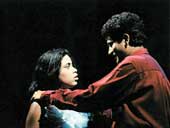 |
| A scene from Romeo-Jeannette |
Compared to the 1960s and 1970s, Bengali groups stage far fewer versions of European drama nowadays. That is not necessarily a shortcoming, for it indicates that original playwriting has taken over to supply the greater proportion of the demand.
Kalyani Kalamandalam generally prefers Indian texts, making an exception with Jean Anouilh?s Romeo-Jeannette this year, faithfully translated by Basudeb Chakrabartti. One may ask why this particular play, when Anouilh has written so many better-known and more widely-performed works. On the other hand, a comparatively obscure piece gives viewers larger exposure to the author?s corpus. As a centre, too, Kalyani seems to appreciate this educational approach, judging by the combined efforts of its groups.
The anti-romantic Romeo and Jeannette (1946) carried the bitter aftertaste of World War II. It even reflects Sartre?s philosophy of existential meaninglessness that had crystallised by that time. Therefore, director Shantanu Das? hope for a conventional ?cathartic? impact seems misplaced because it is anachronistic; on the contrary, his recognition of ?sacrificing happiness? accurately records the characters? feelings as adult compromise replaces youthful purity ? a typical Anouilh denouement. Bindiya Ghosh (Jeannette) acts the Anouilhan gamine competently, but the cast as a whole has difficulties cultivating Western manners.
While Anouilh obviously used Romeo and Juliet as a platform to undercut, Pirandello invented metatheatre as a key concept in 20th-century European drama. Among his classics of the genre, Henry IV (1922) was transformed into Sher Afghan by Ajitesh Bandyopadhyay. Ajitesh Natya Academy, which perpetuates Bandyopadhyay?s legacy, revives that production under Radharaman Tapadar?s supervision. Those too young to have seen it can sample it now, though it certainly does not match the 1966 classic.
In his adaptation, Bandyopadhyay successfully reduced Pirandello?s wordiness (but not his melodrama) in relating how an actor playing the part of Sher Afghan thought he was the medieval ruler after injuring his head during a show. Despite the amateurish touches in the revival, it remains a good introduction to Pirandello?s stimulating concepts of the relativity of truth and the relationships between self and performed self, reality and illusion.











